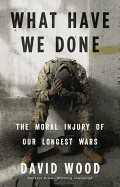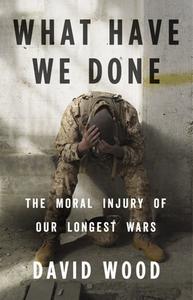
 David Wood was raised a Quaker, did civilian service during the Vietnam War, and became a war journalist after his first assignment to a war zone in 1977. "Having once acted on my conviction that war was morally abhorrent, and having been accorded the government-certified status of conscientious objector, I found war itself to be irresistible." He has been a war reporter for 30 years. "At war I have seen Americans at their best. In a very personal way, I admire and honor their service. Eventually though, I could no longer ignore the nagging sense that... I was looking away from the dark side of war which was causing real damage to the men and women I knew." In his first book, What Have We Done, Wood argues that we have failed to prepare our military troops adequately for the moral shocks and dissonance of war, not supported them during their service and neglected to care for them when they return.
David Wood was raised a Quaker, did civilian service during the Vietnam War, and became a war journalist after his first assignment to a war zone in 1977. "Having once acted on my conviction that war was morally abhorrent, and having been accorded the government-certified status of conscientious objector, I found war itself to be irresistible." He has been a war reporter for 30 years. "At war I have seen Americans at their best. In a very personal way, I admire and honor their service. Eventually though, I could no longer ignore the nagging sense that... I was looking away from the dark side of war which was causing real damage to the men and women I knew." In his first book, What Have We Done, Wood argues that we have failed to prepare our military troops adequately for the moral shocks and dissonance of war, not supported them during their service and neglected to care for them when they return.
"Moral injury" describes the emotional reactions that come with reflection after someone returns from war to safety. "Sorrow, remorse, grief, shame, bitterness and moral confusion--What is right?--signal moral injury, while flashbacks, loss of memory, fear, and a startle complex seem to characterize PTSD." Wood focuses on the long wars in Iraq and Afghanistan because they were our first major conflicts fought entirely with an "all-volunteer" military, which "meant that those who chose to stay home mostly remained ignorant of who served and why." It also meant that because this volunteer military is smaller, its men and women get only brief rests between long deployments, never enough time to recover physically and mentally. Rates of mental illness, suicide and violent crime among active troops and veterans have soared during these wars.
U.S. military training is "the most realistic and thorough combat training in the world," but offers no preparation for the extreme ethical challenges of warfare, instead requiring strict obedience to values and creeds that "thrust its troops into conditions of intolerable moral dissonance." Wood provides an overview of the history of responses to moral injury. He interviews soldiers, marines, mental health practitioners and researchers, including the navy psychiatrist who developed the idea that moral injury is a literal wound, and the therapist who created an effective treatment model for the specific needs of combat veterans.
These matters are not only a problem for our military, however. "What is the accountability of those who engineered the wars? Of the politicians who pushed for and funded the fighting year after year? Of those of us who silently accepted the rationales for war, voted for those in power, and paid our taxes? ...Perhaps we are morally injured as well and, like so many combat veterans, are reluctant to peer into that darkness." What Have We Done offers readers the chance to do so. --Sara Catterall
Shelf Talker: A veteran war reporter examines the relatively recent understanding of moral injury as a literal combat wound that requires acknowledgement and treatment.

